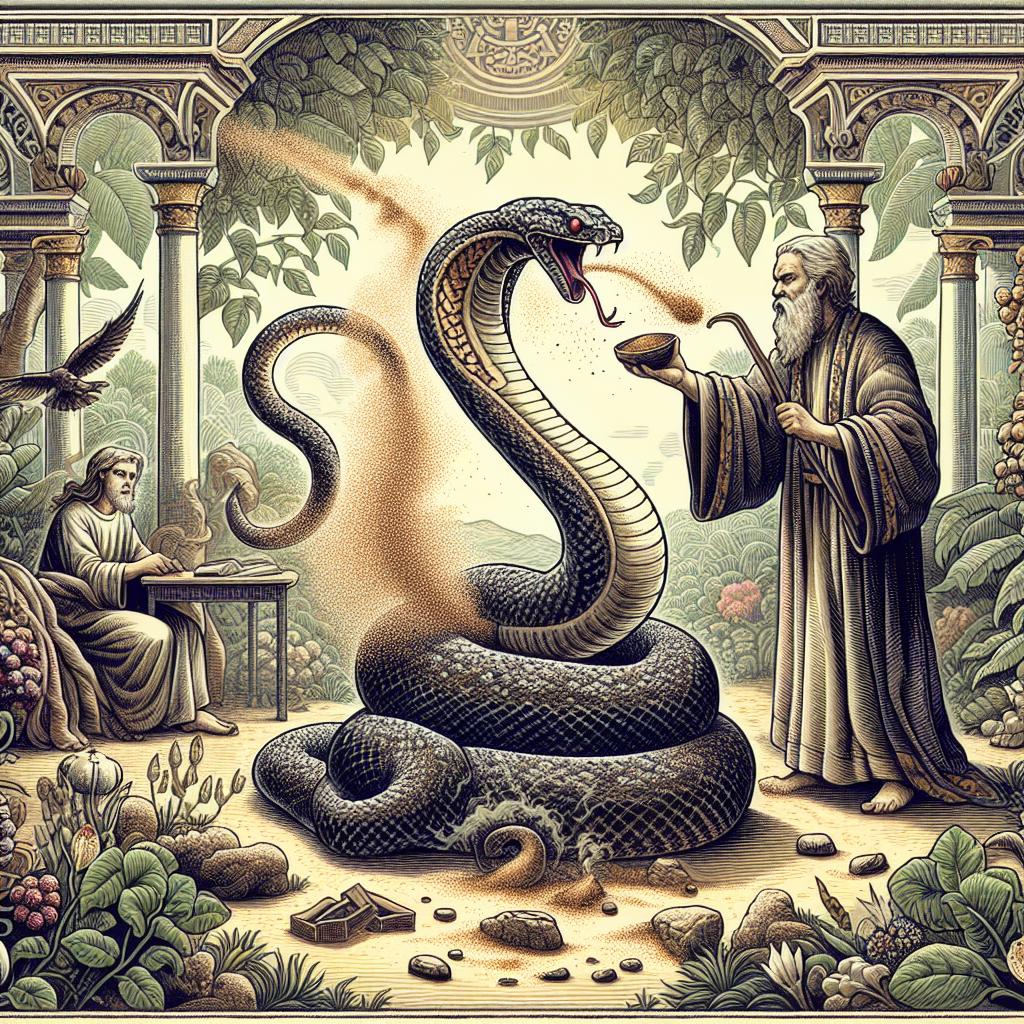
Eternal Truths: Unveiling the Mystery of Snakes and Dust in Christian Faith
Published: 31 July 2024
Snakes: The Marvelous Creatures That Do Eat Dust
Snakes have always fascinated us with their unique characteristics and behaviors. One interesting aspect of snakes is their ability to eat dust, a trait mentioned in Genesis 3:14 where God says to the serpent, "Upon your belly you shall go, and shall eat dust all the days of your life." While it may seem metaphorical or even erroneous at first glance, further investigation reveals that snakes do, in fact, eat dust. Let's explore this captivating attribute of snakes and discover its significance.
1. A Closer Look at the Serpent's Dusty Diet
When we talk about snakes eating dust, we are referring to their habit of deliberately consuming and licking dust particles. This behavior has been observed in various snake species and is not just a metaphorical statement. Snakes possess an organ in the roof of their mouths known as "Jacobson's organ." This remarkable organ aids snakes in their sense of smell, working synergistically with their nose.
To sample scents, snakes use their darting forked tongues. As the tongue flicks in and out, it collects tiny particles of dust on the tips of the fork. These dust-laden tips are then brought back into the snake's mouth to be presented to its sensory organs, where they are "smelled" or analyzed. After this process, the snake needs to clean its tongue before repeating the scent-sampling procedure.
Therefore, snakes genuinely engage in the act of licking dust and consuming it as part of their sensory mechanism.
Why This Matters:
Understanding that snakes indeed eat dust demonstrates the accuracy of biblical statements regarding these creatures. This knowledge highlights how the Bible can provide detailed insights into natural phenomena long before modern scientific discoveries confirm them. It shows that God's Word is reliable, even in seemingly obscure details.
2. Jacobson's Organ: The Snake's Secret Sensory Tool
To comprehend how snakes eat dust, it is crucial to delve deeper into the fascinating world of Jacobson's organ. This specialized sensory apparatus plays a significant role in a snake's survival.
Jacobson's organ, located in the roof of the snake's mouth, acts as a supplementary olfactory system. While snakes possess a nose like many other animals, Jacobson's organ provides them with an additional sense of smell. This organ enables snakes to detect and analyze chemical signals more effectively, enhancing their ability to navigate their environment and locate prey.
3. The Forked Tongue: A Dust Sampling Device
A snake's tongue is not just an ordinary appendage; it serves as a remarkable tool for gathering information about the world around it. The split or forked nature of the snake's tongue is not accidental but purposeful.
When a snake flicks its tongue in and out, it collects scent particles from the air and surfaces it touches. These particles adhere to the tips of the forked tongue, allowing the snake to bring them back into its mouth for further examination. By presenting these samples to Jacobson's organ and other sensory receptors in its mouth, the snake gains valuable insight into its surroundings.
Think About It:
The intricate design of a snake's sensory system, including Jacobson's organ and the forked tongue, provides a compelling example of the Creator's wisdom and craftsmanship. It showcases how God has equipped even the most seemingly insignificant creatures with unique abilities that enable their survival and flourishing.
4. Cleaning the Tongue: A Necessary Ritual
After collecting dust particles on its forked tongue and analyzing them in its mouth, a snake must cleanse its tongue before repeating the process. Cleaning ensures that each subsequent scent sample remains untainted by previous samples.
Snakes achieve this cleaning ritual by rubbing their tongues against specialized structures within their mouths called lingual papillae. These papillae possess unique properties that allow the snake to effectively remove any remnants from its previous scent-sampling activities. Once the tongue is cleansed, the snake is ready to embark on another exploration of its environment.
5. Snakes and Dust: A Biblical Connection
The mention of snakes eating dust in Genesis 3:14 may initially appear metaphorical, but it aligns with the observed behavior of these creatures. The Bible, even in seemingly mundane details, accurately describes aspects of the natural world. It displays an intimate knowledge of God as the Creator, who crafted every creature with unique characteristics and behaviors.
When we encounter passages like this, it reminds us that the Bible is not merely a spiritual guide but also a reliable source of historical and scientific information. It encourages us to explore further and uncover more of the wonders contained within its pages.
6. Snakes: Marvels of God's Creation
Snakes are remarkable creatures that continue to captivate our curiosity. Their ability to eat dust serves as a testament to the intricate design and purpose infused into every aspect of their existence. From Jacobson's organ to their forked tongues and cleaning rituals, every detail showcases their exceptional adaptation for survival.
By exploring the fascinating world of snakes, we gain a deeper appreciation for the diversity and complexity found in God's creation. It reminds us that even in the most unexpected places, we can witness His intricate handiwork and divine wisdom.
Why This Matters:
Understanding the biblical perspective on snakes eating dust allows us to appreciate God's intimate involvement in His creation. It encourages us to marvel at His craftsmanship and recognize that every creature has a specific purpose within His grand design.
As we explore God's creation, let us remember that it reveals His character and invites us into a deeper understanding of His wisdom and creativity. May our encounters with nature inspire awe and draw us closer to the One who crafted it all.
